"Write about the 2012 EoT cakes!" they said.
"You know you want to!" they said.
"Give us our preciousssss!" they said.
Two of the above three are verbatim quotes from my inbox. I am, if nothing else, a slave to your affections, my dear Reader.
"You know you want to!" they said.
"Give us our preciousssss!" they said.
Two of the above three are verbatim quotes from my inbox. I am, if nothing else, a slave to your affections, my dear Reader.
First, we should set the scene, and provide a little context. I love me my Essence-of-Tea cakes. Heaven knows I have enough tongs of the stuff on my shelves. The outfit owned by the man known only as "Nada" has been a constant and reliable source of really rather delicious pu'ercha since 2008, and often at a very competitive price.
This year's cakes are probably the "easiest on the eyes", as our colonial cousins over the Atlantic would probably say. I am quite the sucker when it comes to pretty watercolours, and, if you wrap your tea in pretty watercolours, then I am almost already sold on the tea.
This year's cakes are probably the "easiest on the eyes", as our colonial cousins over the Atlantic would probably say. I am quite the sucker when it comes to pretty watercolours, and, if you wrap your tea in pretty watercolours, then I am almost already sold on the tea.
Almost.
I kicked off my Essencefest with the mysteriously-named "Qishenggu", which is a fictional name to protect the innocent.
EoT always picks pretty leaves for its cakes, and these "Qishenggu" leaves fit the bill. I appreciate the mixture of long- and short-leaved maocha, and the sweet, green scent is doubly appealing.
My son deigns to leave me a little of the first infusion, which is kind of him. "More! Pweeez!" he adds, while giving me Bambi-eyes.
As you might see above, the colour is brutally yellow, almost heading towards being properly green. I can hear the sounds of a thousand Asian people's stomachs crying out in agony at the rawness of this tea. With my frighteningly over-heated northern-European constitution, its absolutely perfect in temperament.
This was a very solid tea. I started off loving it in far-out ways: it has a citric element that adds character, not tartness; the aftertaste is the ever-so-slightly suspicious sweetness of crystallised brown sugar. It thinned just a touch as the infusions passed; it has plentifully enjoyable floral notes at the outset, but these, as always with light florals, do not endure, and are usually the first characteristic to be lost to the aging process.
Stepping up the pricing, the Baotang is £48 which, it must be said, is getting rather expensive for an unaged cake. Perhaps I am permanently stuck in a 2006 pricing groove.
Baotang is in the Mengsong area of Menghai, and it is written that this tea was made with leaves from 300-400 year-old trees, which were hand-processed by a chap who stayed in the village for two months.
Xiaohu has departed for a day in town with his adoring grandmother, and so I look forward to enjoying a rare moment at the tea-table.
The first impression of this tea is very positive: it has a strong, enduring aroma that lasts for well over a minute. For better or worse, I find myself caring about the aroma of the tea, because (I convince myself that) it conveys useful information about the compounds in the soup. Teas with a rapidly-fading aroma seem to be among the first of my cakes to nose-dive in strength with aging, while my most pleasantly-aging cakes seem to be full, in body and in aroma, as young leaves. I don't get this information from the tasting cup - the scent progression is only available in its full, to my senses, when using an aroma cup (wenxiangbei).
(Much ink has been spilled concerning the merits, for and against, the aroma cup, from which I will spare you.)
This cake delivers a thickly-textured soup, with some higher notes of Menghai-area "mushroom", as I often interpret it. The kuwei [good bitterness] reminds me of older teas, and it pushes into all corners of the mouth.
Finally, the one I had been waiting for: the Bulang. EoT has made some face-destroying, eye-melting, bowel-scouringly beautiful Bulangs in the past. I write this with some affection and admiration. The 2011 was totally Taxmaster. The 2010 was rather hardcore. The 2009 was a demon screaming into an old lady's face at point-blank range. They have aged a treat. The earlier cakes were stupendous value; things got a bit uncomfortable in price with the 2010, and then moreso with the 2011.
This 2012 cake is £71. Perhaps it will feature even more demons and Taxmasters for our money! Perhaps.
The monsters mostly come at night. Mostly.
The monsters mostly come at night. Mostly.
Nada writes that he wanted to try something different with this year's cakes. Who can blame a man for wanting to mix things up a little? He has combined maocha from two villages (Manmu and somewhere fairly near) in an attempt to balance the punchy kuwei [good bitterness] of one region with some nominally complementary characteristics from the other region. This could work, methinks.
The aroma is long and engaging, which is a good start. I enjoyed its low, sticky sweetness, noting an obvious departure from previous years' Bulang productions. Initial wisps of smokiness soon dissipate - no problem, 'tis a young cake.
It is calm, smooth, and sweet with a great deal of "chaqi" that is immediately energising. It has a heavy base that tastes very much like biscuit to my addled senses. The kuwei is a marked change from previous years.
My tastes are undoubtedly fickle, but this cake is, to my mind, in a different genre to the aggressive, thrilling heights of its cousins from previous years. Then again, I have strange tastes in pu'ercha, and never really "get" elegant teas, which I know that Mr. and Mrs. Essence enjoy a great deal. It must be something to do with that fact that I am something of a thug.
These cakes are well-made, and well-selected, as ever. They also represent a change for Essence of Tea. Every year, the learnings of Mr. and Mrs. Essence allow them to produce something just a little bit better than the year before.
Addendum
August, 2013
This 2012 Bulangshan is the "without pesticide" sample from Essence of Tea's £15 sampler pack.
The leaves and soup are clean, pure, and beautiful. The two-component mixture is rather obvious: it has a biscuit base that feels a little roasted, and a distinctly separable sharp-sour tone of good old-fashioned Bulang.
My opinion of this tea is, likewise, formed of two separable components: the one positive, the one less positive. I prefer the style of Bulangshan cakes of previous years from Essence of Tea, and am uncertain how the roast "biscuit" profile will age. Time will tell. "Biscuits and grapefruit", I wrote in my journal, in summary.

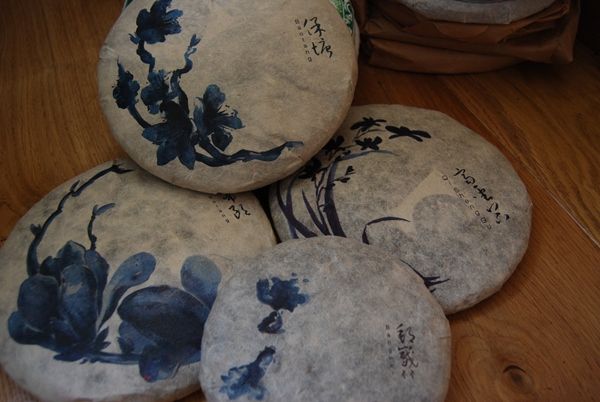
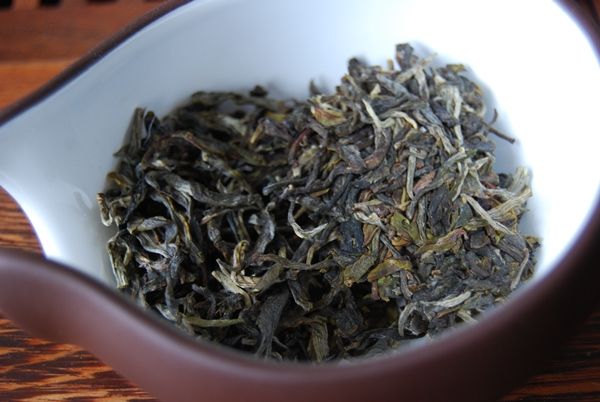
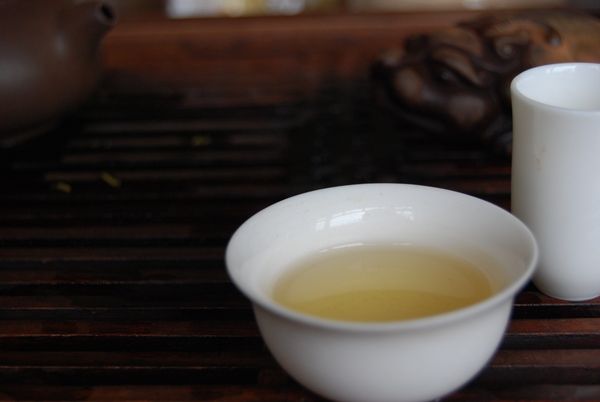
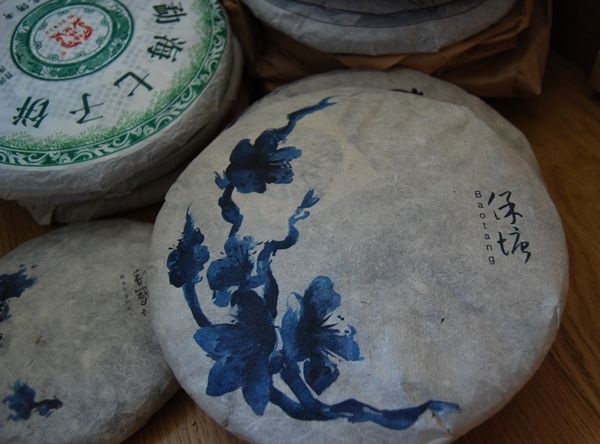
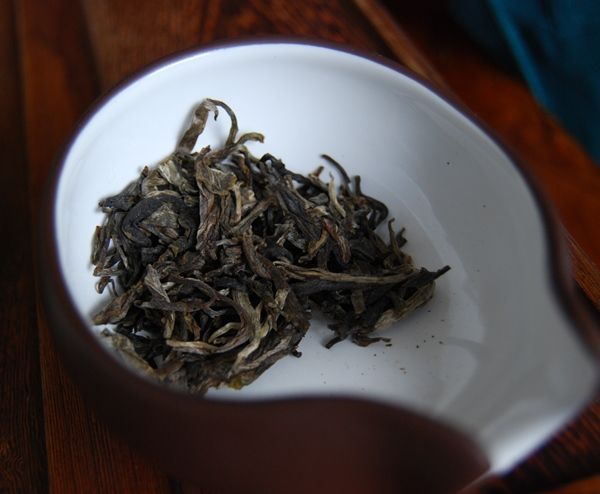
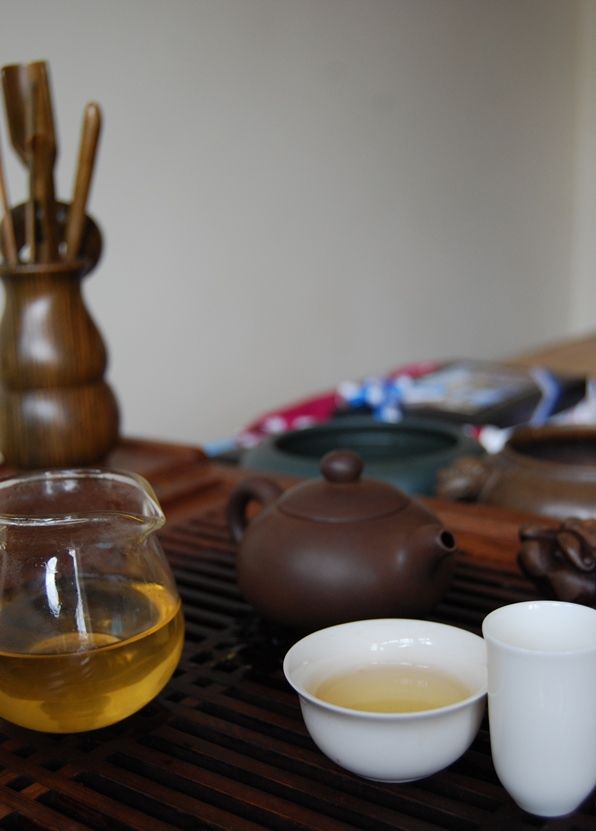
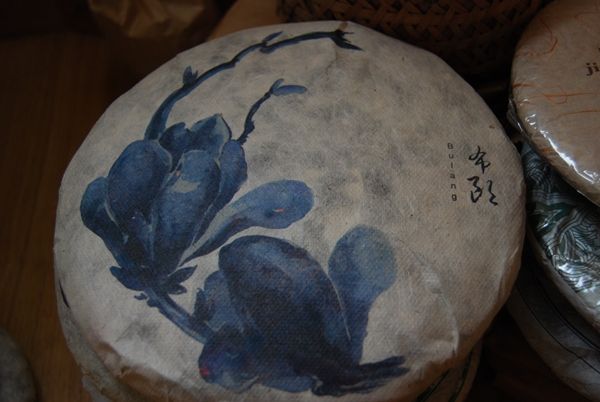
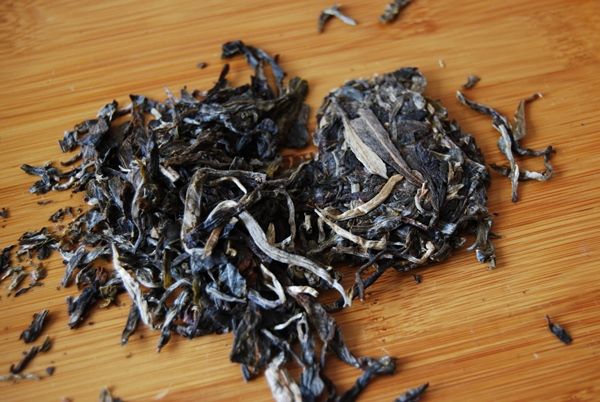
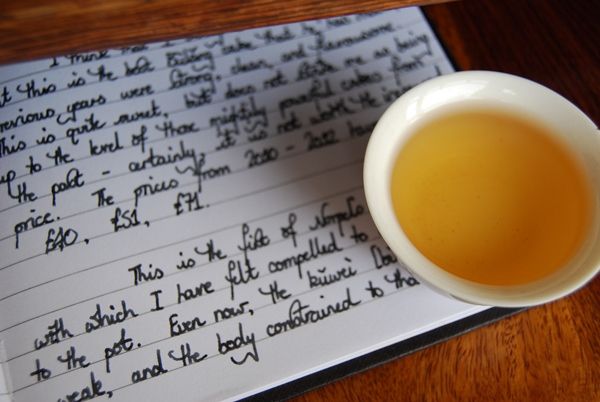


5 comments:
Thanks for the article. Can I ask an unashamedly rookie question: how much time do you steep each infusion, and how do you gauge the water temperature?
Dear Hektor,
There are no silly questions! Oddly enough, I used to care a great deal about timing and temperature, but, certainly for the last five years or so, I "just do it". You get an idea of the appropriate values of the parameters without measuring them. If you delve into the "musings" page of this humble blog, you may find a few articles on the subject (which are quite old now). Essentially, not too long, nor too short, for the infusions. It varies depending on leaf fragmentation (chopped leaves need shorter brews), leaf age, leaf quantity, leaf format (rolled, flat, compressed), and myriad other factors that all feed into the intuition of the brewer. As I wrote some time ago now, I get it wrong from time to time, but the frequency of bad brews has significantly decreased through the years.
It's fascinating how much becomes automatic, and the result of intuition. Perhaps that's not the most helpful answer, but it's the most honest.
Toodlepip,
Hobbes.
Hey Hobbs
Nice article.
Have you noticed how these cakes from the essence of tea have changed considerably since you first tried them not long after pressing.
I agree with you these cakes are the best ones yet.
it is exciting to wait for what will happen this year.
I drink this Bulang most days and find it to be very pure energy, must buy an other cake!
Dear Mister Hobbes, I am a new reader and I must say I enjoy your writing. Thank you for writing about our beloved leaf.
Dear Michel,
They have changed, yes indeed - they've settled rather nicely, much as Nada predicted.
Dear Charles,
That's very kind of you to say so, thanks for the comment.
Toodlepip both,
Hobbes
Post a Comment